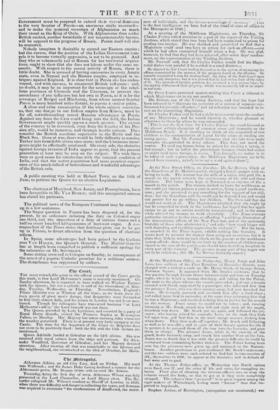At the Bow Street Office, on Tuesday, Mr. Le Breton,
Clerk of the Guardian: of St. Martin's parish, charged a female pauper with re. fusing to work. The woman was the wife of a sailor, who paid 1Ss. a month to the parish towards the maintenance of his wife and three children. The latter were kept at Norwood at an expense of 48s. a month to the parish. The woman wished to leave the workhouse, as she could get sixteen guineas a year in service, being a good needlewos man ; and she promised to pay something for the support of her chit- (hen : but the Guardians said she could not be depended on, and would not permit her to go without her children. She then said that she would hot work at all. The Magistrates admitted that she might by law be compelled to work in the workhouse, but hoped that her appli- cation to go out to service would be reconsidered ; and in the mean while advised the woman to work cheerfully. [Th.. Times entreats particular attentioe to this case, as affording "a striking illustration of the demorahzing effects of the New Pom.law, and of the systematic brutality of those who administer it ;" and ask.. "how !ouch longer will such degrading and insulting oppreeoon be endured ?'' But the facts, as recorded ill the Times' report, exhibit nothing like brutality. It seems hard to prevent the women from going out to service, but it is plain that, if there were no such check on the parent: as the workhouse system affords, there would be no limit to the number of children con- signed to the care of the parish—we should have foundling hospitals in every parr of the country. The promise to pay part of her wages was not to be relied on ; this Mr. Le Bretoe distinctly stated.]


























 Previous page
Previous page